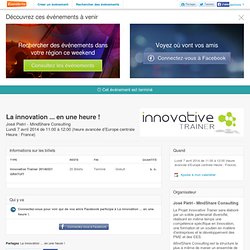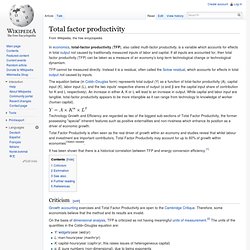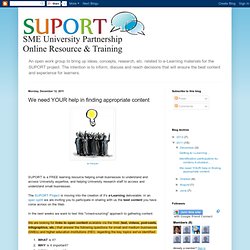

EBN Congress - Innovative Trainer - PIETRI. Bulletin n° 1 LEC : Learn Engage Create (apprendre - s'engager - créer) Welcome to SUPORT SME University Partnership Online Resource & Training. La innovation ... en une heure ! Billets Quantité non valide.

Veuillez saisir une quantité de 1 ou plus. La quantité choisie excède la quantité disponible. Veuillez saisir votre nom. Veuillez saisir une adresse e-mail. Veuillez saisir une adresse e-mail valide. Veuillez saisir votre message ou vos commentaires. Veuillez saisir le code comme illustré sur l'image.
Veuillez sélectionner la date à laquelle vous souhaitez participer. Veuillez saisir une adresse e-mail valide dans le champ À :. Veuillez saisir l'objet de votre message. Veuillez saisir un message. Vous ne pouvez envoyer cette invitation qu'à dix adresses e-mail à la fois. $$$$ n'est pas une couleur formatée correctement. Veuillez limiter votre message à $$$$ caractères. $$$$ n'est pas une adresse e-mail valide.
Veuillez saisir un code promotionnel. s. o. Complet En suspens Vous avez dépassé la limite de temps ; votre réservation a été libérée. Cette limite de temps existe pour garantir la disponibilité de l'inscription au plus grand nombre de personnes possible. Merci. Zut ! Province. The Conscious Competence Learning Model. As music teachers we find it helpful to be aware of the learning model that defines students as at one of four stages: Stage 1 unconscious incompetence Stage 2 conscious incompetence Stage 3 conscious competence Stage 4 unconscious competence The model explains the process and stages of learning a new skill Teachers commonly assume “students” to be at stage 2, and focus effort towards achieving stage 3, when often trainees are often still at stage 1.

We find that when we do one day training courses in churches often people who have been playing an instrument for many years and consider themselves relatively able are quite often unconsiously incompetent. This is no slur on them, simply that they need to develop an awareness of the level of their playing and understand where they might be able to improve in order to have any knowledge of progressing beyond their current ability. It is from this self awareness that real progression and learning can begin. Total factor productivity. The equation below (in Cobb–Douglas form) represents total output (Y) as a function of total-factor productivity (A), capital input (K), labor input (L), and the two inputs' respective shares of output (α and β are the capital input share of contribution for K and L respectively).

An increase in either A, K or L will lead to an increase in output. While capital and labor input are tangible, total-factor productivity appears to be more intangible as it can range from technology to knowledge of worker (human capital). Technology Growth and Efficiency are regarded as two of the biggest sub-sections of Total Factor Productivity, the former possessing "special" inherent features such as positive externalities and non-rivalness which enhance its position as a driver of economic growth.
It has been shown that there is a historical correlation between TFP and energy conversion efficiency.[1] Criticism[edit] Estimation[edit] As a residual, TFP is also dependent on estimates of the other components. Massively Collaborative - Shout-Out for YOUR help in finding appropriate content. SUPORT is a FREE learning resource helping small businesses to understand and access University expertise, and helping University research staff to access and understand small businesses.

The SUPORT Project is moving into the creation of it's e-Learning deliverable. In an open spirit we are inviting you to participate in sharing with us the best content you have come across on the Web. In the next weeks we want to test this "crowd-sourcing" approach to gathering content. We are looking for links to open content available via the Web (text, videos, pod-casts, infographics, etc.) that answer the following questions for small and medium businesses (SMEs) and higher education institutions (HEI) regarding the key topics we've identified: WHAT is it?
Thank you ... we look forward to your links! Suport- Project.
Culture of Innovation. Definitions of Innovation. Discover & Support Innovation. Drivers/Goals of Innovation. EXAMPLES of innovation. Introducing/Inspiring Innovation. Managing Innovation. Measuring Innovation. Organizations focused on Innovation. Prizes for innovation. Strategies for innovation. Training for Innovation. Websites on Innovation. Sources of Innovation Ideas.
CREATIVITY. EVENTS.